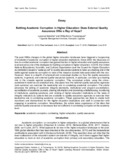| dc.contributor.author | Nabaho, Lazarus | |
| dc.contributor.author | Turyasingura, Wilberforce | |
| dc.date.accessioned | 2019-08-26T10:19:04Z | |
| dc.date.available | 2019-08-26T10:19:04Z | |
| dc.date.issued | 2019-06-17 | |
| dc.identifier.citation | Nabaho, L., & Turyasingura, W. (2019). Battling Academic Corruption in Higher Education: Does External Quality Assurance Offer a Ray of Hope? Higher Learning Research Communications, Online Version. http://dx.doi.org/10.18870/hlrc.v9i1.449 | en_US |
| dc.identifier.uri | https://hdl.handle.net/20.500.12305/409 | |
| dc.description.abstract | The post-1980s changes in the global higher education landscape have triggered a burgeoning
of incidents of academic corruption in higher education institutions. Since 2000, the discourse on
how to combat academic corruption has gained traction in higher education and quality assurance
is advanced as one of the strategies for fighting corruption in higher education. In 2016, the United
Nations Educational, Scientific, and Cultural Organization (and the Council for Higher Education
Accreditation) issued a “wakeup call” to quality assurance systems to take up a leading role in the
battle against academic corruption in view of the massive societal risks associated with the vice.
However, there is a dearth of empirical and conceptual studies on how the quality assurance
systems, in general, and external quality assurance systems, in particular, can take up a leading
role in the crusade against academic corruption. This conceptual article, using the crime–
punishment model as an analytical lens, discusses how the national quality assurance agencies
(and systems) can exercise the leadership role in combating academic corruption. The article
advances the setting of academic integrity standards, institutional and program accreditation,
accreditation of academic journals, sharing information and promoting whistleblowing, monitoring
of institutions, applying sanctions, and ranking of higher education institutions on the basis of
integrity indicators as options that are available to quality assurance agencies to exercise their
leadership role in combating academic corruption. These approaches are likely to create both
incentives and disincentives for the higher education institutions and staff in connection with
engaging in academic corruption. Nevertheless, the article takes cognizance of the idea that
external quality assurance is necessary but not sufficient in combating corruption at the academy
level. | en_US |
| dc.description.sponsorship | Uganda Management Institute | en_US |
| dc.language.iso | en | en_US |
| dc.publisher | Higher Learning Research Communications | en_US |
| dc.subject | Combating | en_US |
| dc.subject | Quality Assurance | en_US |
| dc.subject | Academic Corruption | en_US |
| dc.subject | Higher Education | en_US |
| dc.title | Battling Academic Corruption in Higher Education: Does External Quality Assurance Offer a Ray of Hope | en_US |
| dc.type | Article | en_US |

